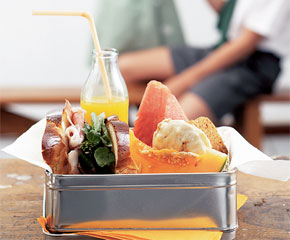‘Parents should not give their children chips, burgers and
Nuggets simply because they demand it, they need to take control… and give them what they really need – the most fundamental thing of all – good food.’
So said Jamie Oliver, writing in Britain’s Daily Mail at the height of his Feed Me Better campaign to drive junk food off the menu in British schools and homes.
So why is it that so many parents feed their children a staple diet of processed convenience foods laden with fat, sugar, salt and preservatives.
The above is true, according to the findings of a massive study into the effects of promoting junk food to children, conducted across the UK for the Food Standards Agency in 2001.
The researchers concluded that many parents felt bombarded with conflicting advice about healthy eating, and responded by ignoring a lot of it. Others were simply nutritionally confused or ignorant.
Not surprisingly, similar patterns exist in South Africa.
A visit to a private junior primary school in Durban at ‘snack time’ revealed that few children had nutritious, unprocessed food in their lunch boxes.
Two-thirds of a Grade R class of six-year olds had a brand of highly processed savoury biscuits, high in hydrogenated fat, the unhealthiest form of fat. Coloured, sweetened yoghurts were common, as were packets of chips – high in fat and sugar – and sugary drinks.
A team of scientists at Southampton University in the UK studied the effects of food additives on 400 three-year-olds chosen at random, among them those who showed signs of hyperactivity and those who didn’t.
For a month, the parents excluded all additives and preservatives from their diets, followed by alternating weeks drinking pure fruit juice, and juice laced with colourings such as tartrazine and carmoisine and the preservative sodium benzoate. The drinks looked and tasted identical and the parents didn’t know the difference, but the children’s behaviour varied greatly – they were far more disruptive during their ‘additive weeks’.
In South Africa, about five million primary school children in low-income areas receive a Primary School Nutrition Programme (PSNP) meal every school day, and it never includes the likes of chicken nuggets and chips.
‘They get rice and vegetables, or potato curry with carrots, samp and beans… that sort of stuff,’ a Grade 1 teacher at a school in the Durban area told me.
‘But most of them would prefer to eat the stuff sold in the tuck shops and by vendors – things like vetkoek, sweets and quarter loaves stuffed with fried chips.’
Kids will be kids – what’s the problem?
It’s a big problem, in more ways than one. Low-nutrient, highly processed foods not only affect children’s behaviour and educational potential, but are also extremely fattening. And given that children are exercising less, child obesity rates are soaring.
‘One out of four young teenage girls in South Africa is clinically obese now,’ says Professor Tessa van der Merwe, who chairs the South African Society for the Study of Obesity. ‘It’s an epidemic.’
Obese children are prime candidates for diabetes and are likely to become obese adults, at great risk of suffering hypertension and heart disease.
And as long as tuck shops are profit-driven, with the schools deriving a cut of the profits, they’ll be reluctant to remove the big sellers. How many children will choose a brown bread sandwich when it’s sitting next to a packet of chips?

